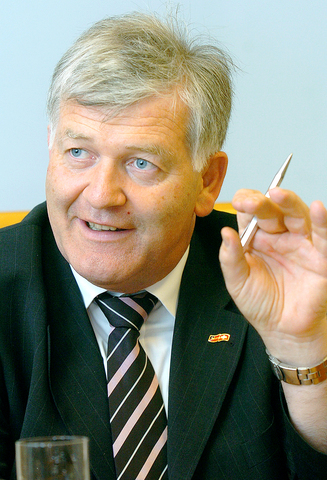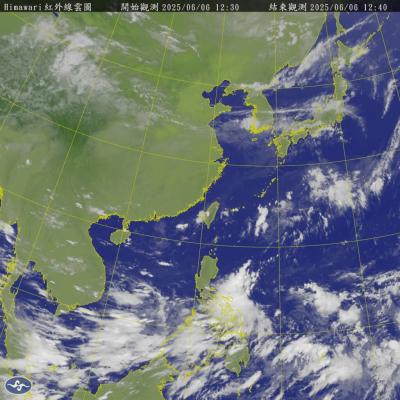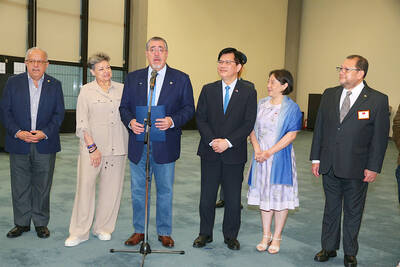Taipei Times: Switzerland is relatively far from East Asia, and your nation, with its long history of neutrality, does not seem to exercise a great deal of influence in this region. Why is Taiwan important to Bern?
Bruno Frick: Taiwan is important to Switzerland in many ways, but particularly in two areas. The first is, of course, as a very important economic partner. Switzerland-Taiwan trade equalled US$1.6 billion last year, with a trade balance in favor of Switzerland. My country exports about US$1 billion to Taiwan each year, and Taiwan's direct exports to Switzerland reached US$600 million in 2004.
The second area of importance is Taiwan's role as a strong democracy -- perhaps the leading democracy -- in East Asia. Taiwan and Switzerland are partners in freedom and democracy. We also have many important cultural exchanges.

PHOTO: CHIEN RONG-FENG, TAIPEI TIMES
TT: So since Switzerland and Taiwan are "partners in freedom and democracy," Bern must have an interest in preventing a conflict between China and Taiwan. What can Switzerland do to reduce tensions in the Taiwan Strait?
Frick: The key is for Switzerland to be realistic. We must recognize the reality of the situation. Taiwan can not declare itself independent now, but it is a de facto independent state. Everyone -- the whole world -- knows this. China is trying to reduce Taiwan's power and international influence. So the Swiss must be aware of this situation and remember that Taiwan is a free country.
TT: But is there nothing more substantial that can be done? For example, although Switzerland is not a member of the EU, it does have some influence on its European neighbors through trade and political dialogue. So when the EU was considering lifting its ban on arms sales to China, did Switzerland take action?
Frick: Our country does not interfere in the internal politics of other countries, and does not try to shape their policies -- unless it is a matter of protecting human rights.
However, Switzerland has banned the sale of weapons to China because of its human-rights record and its occupation of Tibet. Our country will do what it can to ameliorate the human-rights situation in China, and we are working to reform the [UN] Human Rights Commission [in Geneva].
TT: Taiwan has tried 13 times to join the World Health Assembly [WHA, the World Health Organization's governing body] as an observer. Many here view the failure of the WHA to allow Taiwan to join as a violation of human rights, as well as a danger to international health. Does Switzerland back Taiwan's effort to join the WHA?
Frick: I believe that the WHO should invite any organization that can a play a role in dealing with health issues to join it. Obviously, the politics involved with Taiwan's WHO bid hinge on whether it can be accepted as a "state." But I think that some kind of observership role should be accorded to Taiwan to close a dangerous loophole -- as shown with the SARS outbreak.
TT: You met with President Chen Shui-bian (陳水扁) early in your visit, and he pointed out that Bern had voted against Taiwan in its most recent bid to join the WHO. He asked you to support Taiwan's next bid. Will Bern vote differently next year?
Frick: Again, I believe Taiwan should be given a role as an observer. I support the bid, and I will speak with others in my government about this issue.
TT: Switzerland only recently -- in 2002 -- joined the UN. Taiwan is also trying to become a UN member. Do you think it is possible for Taiwan to succeed?
Frick: It will be difficult for Taiwan to join the UN as a full member. Taiwan can not at this time declare independence, and it is almost impossible for European states to recognize Taiwan if things continue as they are. We have to live with the reality that China has huge resources in terms of economics and propaganda.
TT: Can Taiwan overcome Chinese propaganda?
Frick: China has nearly 50 diplomats in Bern alone. Propaganda will have its effect. Therefore, it is important that Taiwan invite as many people as possible -- such as opinion leaders, politicians and journalists -- to gain a firsthand knowledge of the facts. To see once is better than to read a hundred times, as we say in German.
TT: How can Taiwan-Switzerland relations improve in the future?
Frick: I hope trade, tourism and cultural exchanges will continue to increase. Taiwan's industries and technologies advance very quickly, and Switzerland needs to collaborate with Taiwan.
Also, we get about 50,000 Taiwanese tourists every year, and I hope that number will grow.
In fact, here is an interesting story. On the top of one of our major tourist attractions, Mount Titlis, there are many flags from different countries waving in the wind. One of those flags is from Taiwan. Chinese diplomats used to visit Mount Titlis every summer, but ever since that flag was put up, they haven't come back.

Greenpeace yesterday said that it is to appeal a decision last month by the Taipei High Administrative Court to dismiss its 2021 lawsuit against the Ministry of Economic Affairs over “loose” regulations governing major corporate electricity consumers. The climate-related lawsuit — the first of its kind in Taiwan — sought to require the government to enforce higher green energy thresholds on major corporations to reduce emissions in light of climate change and an uptick in extreme weather. The suit, filed by Greenpeace East Asia, the Environmental Jurists Association and four individual plaintiffs, was dismissed on May 8 following four years of litigation. The

STAY AWAY: An official said people should avoid disturbing snakes, as most do not actively attack humans, but would react defensively if threatened Taitung County authorities yesterday urged the public to stay vigilant and avoid disturbing snakes in the wild, following five reported snakebite cases in the county so far this year. Taitung County Fire Department secretary Lin Chien-cheng (林建誠) said two of the cases were in Donghe Township (東河) and involved the Taiwan habus, one person was bit by a Chinese pit viper near the South Link Railway and the remaining two were caused by unidentified snakes. He advised residents near fields to be cautious of snakes hiding in shady indoor areas, especially when entering or leaving their homes at night. In case of a

A tropical disturbance off the southeastern coast of the Philippines might become the first typhoon of the western Pacific typhoon season, the Central Weather Administration (CWA) said. The system lacks a visible center and how it would develop is only likely to become clear on Sunday or Monday, the CWA said, adding that it was not yet possible to forecast the potential typhoon's effect on Taiwan. The American Meteorological Society defines a tropical disturbance as a system made up of showers and thunderstorms that lasts for at least 24 hours and does not have closed wind circulation.

DIPLOMACY: It is Guatemalan President Bernardo Arevalo’s first visit to Taiwan since he took office last year, while Eswatini’s foreign minister is also paying a visit A delegation led by Guatemalan President Bernardo Arevalo arrived in Taiwan yesterday afternoon and is to visit President William Lai (賴清德) today. The delegation arrived at Taiwan Taoyuan International Airport at 4:55pm, and was greeted by Minister of Foreign Affairs Lin Chia-lung (林佳龍). It is Arevalo’s first trip to Taiwan since he took office last year, and following the visit, he is to travel to Japan to celebrate the 90th anniversary of diplomatic relations between the two countries. Arevalo said at the airport that he is very glad to make the visit to Taiwan, adding that he brings an important message of responsibility